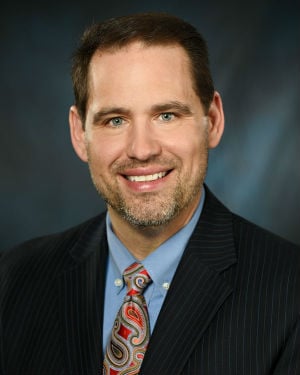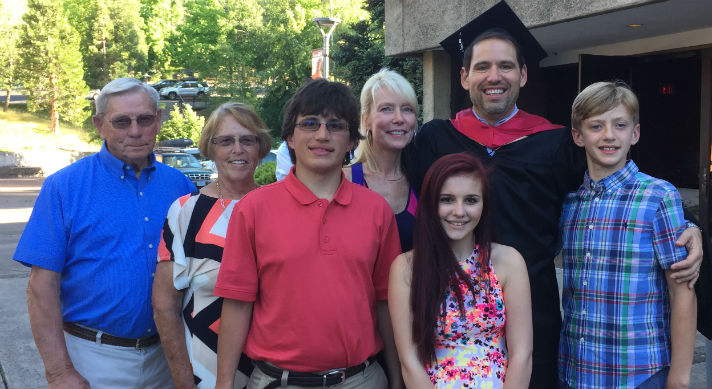 Richard Bodager already had more than a decade of CEO experience when he was ready to move to a larger company. But, instead of landing job interviews, he was met with a rude awakening.
Richard Bodager already had more than a decade of CEO experience when he was ready to move to a larger company. But, instead of landing job interviews, he was met with a rude awakening.
“I was talking to HR departments and learned that people don’t look at the resumes anymore,” he said. “They have companies or algorithms that go through and filter out resumes. Even if the job says ‘master’s degree preferred,’ if they get 10 resumes of people who have master’s degrees, they just drop everybody else. What I was finding was I wasn’t making it through the filter. There was a piece of me that was like, ‘Well, I’m doing okay. I’ll be fine.'”
Then, came an even ruder awakening.
“There was a company looking to acquire my company, which didn’t work out,” Bodager said. “I was chatting with the person in charge of that company about what it would look like post-acquisition. He made this off-handed comment, ‘Luckily, you have your master’s degree, because our company requires all of our vice presidents to have a master’s degree.’ I said, ‘I don’t have a master’s degree; I have a CPA.’
“He said, ‘Oh, we’ll have to demote you and give you three years to get your master’s degree. Otherwise, you are going to have to stay a director.’ I said, ‘I’ve been in this position for five years’ — and, at that time, I’d been a CEO for 10 years – ‘and you’re telling me I’m not qualified for my own position?’ It really hit me hard. I really felt like I wasn’t relevant anymore.”
So, Bodager took action. He enrolled in the Master of Business Administration program at Southern Oregon University. Bodager graduated in 2015 as the school’s MBA Student of the Year and was invited to speak at the hooding ceremony prior to graduation.
“That was a great honor,” he said. “It was a testament to the fact I wasn’t too old to get it done. What the MBA did was just massively open up doors. All of a sudden, I could have ‘MBA’ on my resume, and I started getting people talking to me and opportunities coming my way after graduation. I look at it as SOU gave me the key, and I unlocked the door.”
Serious Serendipity
Bodager grew up in Charleston, West Virginia, where he graduated from West Virginia State University with a Bachelor of Science in Business Administration in Accounting in 1994.
“I hadn’t even graduated from college when I was working in the accounting department at Charleston Area Medical Center,” he said. “I was the lowest man on the totem pole. I was only 23 years old. I didn’t even consider that healthcare could be a long-term career.”
However, the opportunity to work as a part-time accountant for a company the hospital was creating [Medical Management Services] came up. Bodager jumped at the chance, which turned out to be a very smart move.
“Within three or four years, that small company was about a $50 million company,” he said. “After I graduated with my bachelor’s degree, I was made the chief financial officer in 1995. It was one of those things where nobody wanted to stick their neck out and take an opportunity. It was a new start-up. They weren’t guaranteed hours. They weren’t guaranteed this or that. I just said, ‘Well, I’ve got nothing to lose. I’m just going to jump in and do this.'”
Just like that, Bodager had charted the course for a successful career in the healthcare field. The company acquired physician groups and managed them using capitation agreements that pay providers by the number of enrollees covered, allowing the physician groups to focus on managing the health of a population.
“My job was to go out and value the businesses, acquire them and integrate them,” he said. “I was the acquisitions guy. I was 25 or 26 years old, and I had no business being in that position at all. The great thing about being thrown into the fire is you have to learn quickly or you burn up.
“If it was through resilience or whatever, I just kind of made it through and became a subject matter expert on valuing and acquiring large physician practices. We grew that business to about 87 doctors in that three- or four-year period. I really found that I liked healthcare, and I had just gone through a significant amount of experience in the healthcare space. It just made sense to try to continue down that path. It’s been a great path.”

Hello, Pacific Northwest
Bodager had moved on to a position as executive director of the Rockford Clinic, near Chicago, when he met his future wife, Sheri. After they married in 2001, the couple decided to put the harsh winters they had battled all of their lives behind them and move to the West Coast.
“We just said, ‘There have got to be nicer places to live,'” he said. “Sheri’s brother lived in Portland, Oregon, so we were out there a lot and out on the Oregon coast because he had a beach house there. We just said, ‘I think the west coast is a good place.’ I did some interviews in Washington, Northern California and Oregon. In late 2004, we found this small town, Medford, and said, ‘Okay, we could be here. This is nice. Great weather. Ashland, Oregon, is not too far away.'”
Bodager did consulting work with his clients in Illinois for two years before landing a CEO position with Southern Oregon Cardiology in 2006. Bodager, who has two children from a previous marriage, Jesse (23) and Sophia (19), and another son with Sheri, Zavier (15), took some courses at Rogue Community College in 2012 so he would have enough credits to obtain his CPA license in Oregon. He enrolled in the SOU MBA program the following year.
“Like a lot of people, I was bucking and fighting and saying, ‘Who’s got the time? I’ve got a family. How am I going to make it work?'” he said. “Finally, I sat down with my wife, who got a master’s degree when she was younger. We just said, ‘We’ll make it work. We’ll figure it out.'”
With SOU just a few miles away from home, Bodager found the ideal location for his return to higher education.
“I really liked the program,” he said. “I liked the way it was designed. I liked the pace. Ultimately, I just decided I needed to go for it. I have to say that I’m incredibly happy that I did. It was way more work than I had imagined. It was juggling a family, still working full-time and trying to maintain a relatively decent grade point average. It was one of the toughest things I’ve ever done but, like they always say, when you want to get something done, give it to someone who’s busy.”
Positive Impact
Bodager’s two favorite courses in the MBA program were MBA 575: Advanced Organizational Behavior, taught by Dr. John Bowling, and MBA 516: Managerial Accounting for Decision Making, taught by Dennis Slattery. He enjoyed the Advanced Organizational Behavior course because he got to know some of his classmates for a team project.
“That was very rewarding. It really made you … learn about the people you work with. There were two people on my team that I’m still very good friends with today and see quite often.”
The latter course was also enjoyable for Bodager in a completely different way.
“Dennis had me do some additional work and some teaching of the class,” Bodager said. “He wanted to be able to use a student who had real-world knowledge and was a CPA. That ended up again being very rewarding because it forced me to get out of my comfort zone and really learn the material to be able to teach it to others.
“Even though I was a CPA, a lot of this stuff we were going over I hadn’t touched in years. I had to really brush up. That’s what I liked about it — it wasn’t cookie cutter. It was very much, ‘Well, you’re already strong in this skill set, so how can you help the rest of the class come up to speed on that?'”
One of the most important residual effects of the MBA program came at home with his youngest child.
“Zavier would see me on Saturday mornings getting up and working, going to do stuff with the family, and then going back at it late at night,” Bodager said. “He got to see what it took from a work ethic standpoint. All of my kids were there for graduation, so it was really wonderful for me to be able to speak at the hooding ceremony. I was really talking to my kids about the work, the reward, and the doors that get opened up.
“My oldest son still talks about that speech and how it meant a lot to him to see his dad go through all of that work. He could clearly see the link between the moment I got that degree and how I was able to move to the size organization that I wanted to.”
Goodbye, Pacific Northwest
Graduating with an MBA put those once-elusive job interviews within Bodager’s reach.
“I probably interviewed for five or six major opportunities after graduation,” he said. “The MBA got me through the filter, which allowed me to really drive from there. It was a very difficult but very rewarding experience for me.”
Bodager landed the CEO position at Desert Radiology in Las Vegas in 2016. Desert Radiology is one of the largest private radiology and imaging services companies in the US. It was the step up that Bodager was looking for in his career.
“Healthcare definitely has its challenges,” he said. “You work with physicians, which has its challenges. But it’s meaningful work, as silly as that sounds. That’s one of the things I like about healthcare — your focus, above all other things, is how do I take care of people? There’s a lot of meaning there. It’s something to be proud of. It’s not just about the business. It’s not just about making money. The core functionality is taking care of people.”
Bodager credits Sheri with providing him with the support he needed to earn an MBA and making it past those resume filters.
“She was phenomenal,” he said. “There were very few times she complained about my school schedule, our family schedule and our work schedule colliding. She really helped make it work, so I have to give her huge kudos.”
Of course, the former MBA Student of the Year still highly recommends the SOU program.
“I would tell anybody thinking about the MBA program to let go of all of their fears, and that the time and the effort is worth it,” he said. “It’s worth the reward. I would say, ‘Lean in and do it because it’s going to be one of the most important things you do.’ I would also support it just because the job market is changing.
“The number of people now with master’s degrees makes the job market incredibly competitive. It is absolutely worth the investment of time and dollars. It will pay dividends, or at least will give you a chance to prove yourself.”
Learn about the SOU online MBA program.